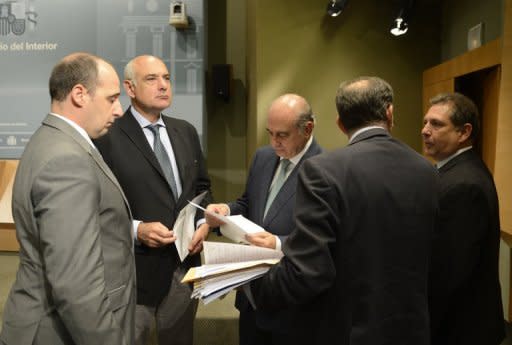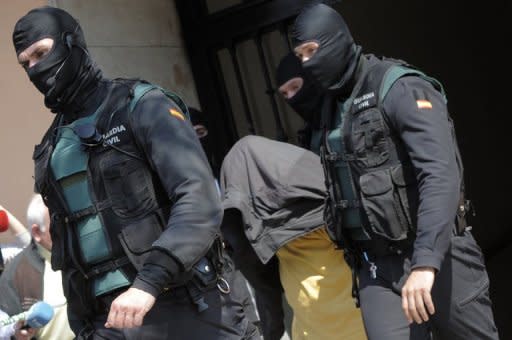Spanish police arrest Al-Qaeda suspects, seize explosives
Spanish police arrested three suspected Al-Qaeda members thought to have been planning an attack in Spain or elsewhere in Europe and seized explosives, the government said Thursday. Interior Minister Jorge Fernandez Diaz told a news conference that one of the three men was "a very important operative in Al-Qaeda's international structure". Two of the men were arrested on a bus heading for the French border and the other in a flat in the town of La Linea de Concepcion, in the southern province of Andalucia, where police also discovered the explosives. The arrests came within hours of each other on Wednesday. "This is one of the biggest investigations which has been carried out up until now against the Al-Qaeda terrorist group at an international level," said Diaz. He described the men as "extremely dangerous people." Police also found documents relating to flying light aircraft. The two on the bus were arrested in Almuradiel in the central province of Ciudad Real while travelling from Cadiz to Irun near the French border. "There is a clear indication that those arrested could have been planning an attack in Spain or in Europe," Diaz told reporters. The suspect detained in the flat at La Linea is a Turkish national -- described by the minister as an al-Qaeda logistics expert -- while the other two are from former Soviet republics which the minister did not name. Earlier on Thursday Cadena Ser radio, citing police sources, said the suspects were two Chechens and a Turk and were in possession of poison as well as explosives. The minister said police had so far found no poison but he said the secret services of other nations had informed Spain that one of the suspects "has extensive experience in the manufacture of poison and car bombs." He declined to comment on Spanish media reports that the three men had links to Pakistan's Lashkar-e-Taiba militant group blamed for the November 2008 attack on Mumbai that killed 166 people. The minister said one of the two men detained in Ciudad Real "used uncommon strength to resist arrest, using the military training he received, and special forces had to intervene." Police had the men under surveillance and decided to arrest them when it appeared that they were going to leave Spain. The investigation has been assigned to a judge at Spain's top criminal court, the National Audience which has jusridiction over terrorism cases and international crimes. Several Islamic extremists have been arrested in recent years in Spain, especially in Catalonia in the northeast. In March police arrested a suspected member of Al-Qaeda in the eastern city of Valencia on terrorism charges. They said he ran one of the world's most important jihadist forums dedicated to recruitment and indoctrination. The man, a Saudi, was known within the organisation as "Al-Qaeda's librarian", Diaz told reporters at the time. On March 11, 2004, bombs exploded on packed commuter trains in Madrid, killing 191 people and wounding 1,841 others in attacks linked to Al-Qaeda. Twenty-one people, mostly Moroccans, were convicted of involvement in those attacks.




